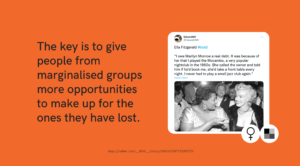We have talked about the fact that systemic and subtle discrimination accumulates over time, so what is the antidote for that?
There are three things you should prioritise as antidotes – providing opportunities, creating safe spaces, and sharing power.
Providing Opportunities
In the image below, Marilyn Monroe used her privilege (ie. sharing her power) to give Ella Fitzgerald an opportunity so she never had to play a small jazz club again. Ella didn’t need mentoring, nor did she need to improve her skillset, she simply needed an opportunity. This is why opportunity is the antidote to discrimination and the key is to give people from marginalised groups more opportunities to make up for the ones they have lost.

One of the ways you can do this is to take into account Achievement Relative to Opportunity, reduce the weighting of experience when hiring, and increase the weighting of Continuous Improvement Skills.
Creating Safe Spaces
It is difficult to change an entire organisation into one big safe space. This is because some organisations are large and creating safe spaces is a leadership skill that not everyone has or wants. This is why you should focus to create a safe space in your sphere of influence.
The best way to create safe spaces is to ask your team mates, co-workers etc what they need to feel safe and be productive on a regular basis, take that on board and try to act on it, based on the relative degree of difficulty that people from marginalised groups may face.
This is not straightforward, many people can be very cautious, and you are likely to make mistakes and feel uncomfortable early on. It is how you react to negative situations that many people from marginalised groups will use to decide if they are in a safe space.
Sharing Power
Sharing power includes helping people from marginalised groups with introductions, mentoring them and hopefully building enough trust to sponsor them.
Sponsorship means advocating for people when they are not in the room, eg. suggesting a marginalised colleague or candidate for a job when they aren’t in the room when there is talk of a new job opportunity being planned (that they would be great for). But the best advice is to ask the person themselves what they think they need, see what their strengths are and take that into account when deciding to identify or fight for opportunities for them.
Instead of applying for a choice opportunity for yourself, encourage, mentor and help people from a marginalised group apply. This is not tokenism if they have the talent and potential and you are willing to share your skills and experience with them.
If you are in-person at a hybrid conference, you could keep a few remote attendees in mind when you are networking with others physically. This allows the remote attendees to get more opportunities to network through you.
More Information
For an example, have a look at the articles 18 ways you can help right now as an individual and Helping intersectionally marginalised people as an individual